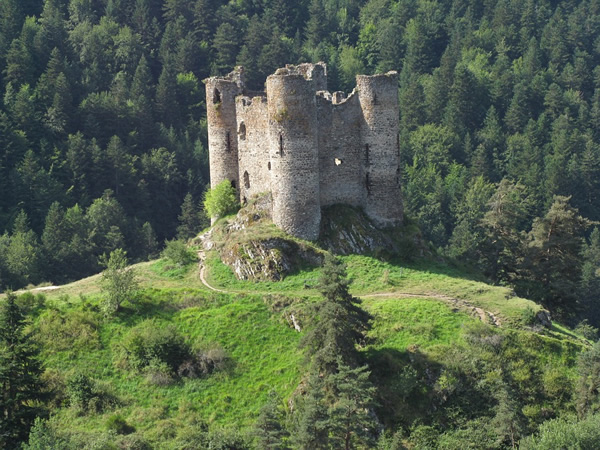Volunteer Programs in Europe
European Projects and Vacations from Restoring Medieval Castles to Teaching
by Volker Poelzl

|
|
Volunteers are needed to help preserve Europe's heritage, including many projects restoring castles.
|
Europe remains the world’s wealthiest continent, and the need for international volunteers differs from the more impoverished regions in Africa or Latin America. But even with well-developed welfare, education, and health programs, some communities across Europe require volunteers. Needs include teaching English, child care, conservation, or preservation work on the many castles and other monuments scattered throughout the countryside. Volunteer service or a vacation in Europe is a great way to help people and communities in need and a transformational opportunity to get to know local Europeans. As a participant, you can immerse yourself in their respective cultures. You can learn a new language. You can experience Europe differently and more deeply than most short-term travel allows.
Where Can You Volunteer in Europe?
Eastern Europe has become a prime destination for international volunteers since it is Europe’s poorest and least developed region. The fall of communism continues to leave a legacy of neglected communities with fewer resources to fend for themselves in the new capitalist economies of their countries. Volunteer work in Eastern Europe focuses primarily on social development projects, child care, and education in Romania, Poland, and the Baltic states. Volunteer work in Western Europe can be found everywhere, from the U.K. to Greece and Portugal to Germany. Opportunities range from restoration projects and environmental preservation to teaching and farming. Social service volunteering (mainly working with children, people with disabilities, and older adults) is always needed. There are long and short-term volunteer opportunities all over Europe, ranging from two weeks to a year. No matter your available time, you can rest assured that you will find a volunteer position that suits your schedule.

|
|
Volunteer programs in dolphin and marine research are offered in Italy and Greece.
|
Volunteer Work Camps
Work camps are far more enjoyable than they sound, as they allow collaboration and engagement with locals and people from around the world on various projects at a low cost. (The Editor and his sons have participated in work camps restoring ancient castles and water mills, for example, at low cost but with rich rewards and lasting friendships.) Such camps in Europe often involve constructing, maintaining, and restoring historically or culturally significant sites or even archaeological excavations. Many are short-term volunteer projects geared toward local and international young people, including students. Most take place during the summer, usually between two and four weeks. Since participants work under local supervision, with no previous experience is necessary. In general, they do not pay participants. Yet, room and board are usually provided for the duration of the stay either for free or at very low cost.
Imagine helping to rebuild a 1,000-year-old castle approximately the same way it was originally built! Participants generally volunteer during the week and have the weekends off for leisure and cultural activities.
Volunteers usually work with local groups and under local supervision who provide technical expertise. Also, as the name camp suggests, accommodations and living arrangements are camp-like and very group-oriented. Accommodations are often dormitory, but sometimes you can sleep in lofts of hay or other creative locations if you so desire. Food is usually prepared collectively and served in large dining tents or rooms. The social aspect of work camps is its best-known quality, as locals often work with volunteers from dozens of different countries, allowing for deep language and cultural immersion as well as lifelong friendships. Since volunteers come from various countries, working knowledge of the local language is optional, but local language immersion is typical. Although it is helpful, you will likely pick up some knowledge. Several international organizations offer work camps in Europe, among them the vast network that is Volunteers for Peace (VFP). There are also excellent country organizations such as the R.E.M.P.A.R.T. in France.
Volunteers for Peace works directly with N.G.O.s worldwide, offering very reasonable rates. VFP’s European projects require only a US$500 registration fee to participate in one of many volunteer projects. Shared housing is usually included, but food is not. Work camps offer inexpensive volunteer opportunities compared to commercial programs, although you are responsible for arranging flights and visas, travel insurance, and leisure activities. In addition, there probably won’t be any pre-departure training or in-country orientation and support. Still, if you don’t mind a more independent approach, volunteering this way might be perfect.
Volunteering on Organic Farms in Europe
Another prevalent activity similar to work camps, with many options in European countries, involves volunteering on organic farms. Much emphasis is on communal living, shared activities, and responsibilities. Organic farms usually offer room and board in exchange for your work. You occasionally also receive a small stipend. The work may be challenging, but the rewards are often great if you enjoy working with the earth and with people from around the world. Volunteering on organic farms is also a great way to extend your travel to Europe if your visa allows (typically three months at a time, maximum). The best way to find an organic farm for volunteer work is through WWOOF. This fantastic worldwide network connects organic farmers and volunteers. Workaway, Worldpackers, and HelpX have excellent websites offering low-cost farm work and work exchange opportunities with local European hosts for a small yearly membership fee.
Environmental Preservation
Stricter environmental regulations by the E.U. have been a boon to protecting threatened ecosystems and wildlife in Europe. While many species have been nearly extinct, there has been a comeback of native ecosystems and wildlife in many areas across Europe thanks to the work of wildlife and conservation organizations and government agencies. Although opportunities in preservation are less abundant than in other types of volunteer work, there are still numerous projects where volunteers are welcome to lend a hand or share their expertise. Volunteer work for the environment is among the most expensive volunteer options.
Among the many opportunities to work with wildlife and environmental preservation are wildlife sanctuaries for wolves in Portugal, bearded vultures in Spain, and dolphin, whale, and turtle research projects in Spain, Italy, and Greece. If you want to volunteer in the U.K., you could volunteer with the National Trust (which administrates the U.K.’s natural, cultural, and historical heritage) and work on conservation and restoration projects. The National Trust’s site states: “Whether you fancy carrying out a survey of moorland plants or herding goats to drystone walling or organic gardening, we will have something to suit you and all in the stunning countryside or coastal locations.”
Volunteer Teaching Opportunities
Although English is widely taught across Europe, there are still rural communities and small towns, especially in poorer Eastern European countries, where volunteer English teachers are needed to teach children, adolescents, and adults. But there are even projects in Western Europe (Italy, Spain, Portugal, Greece, and others) where volunteers work with children and offer English classes. During the communist era, English was not widely taught in Eastern Europe. There was still a need for skilled English teachers, primarily due to the eastward expansion of the E.U. and the increasing trade of Eastern countries with the rest of the world. Many of these volunteer English-teaching opportunities focus on allowing the locals to learn and practice English with native speakers, which is ordinarily difficult in rural and remote areas without a large English-speaking expatriate community. Classes are usually taught in small groups in elementary and secondary school classrooms and community centers. Professional teaching experience is generally optional. Your native English-speaking skills are sufficient in most cases.
Working with Children and Youth
There are many opportunities in Europe for volunteers interested in working with children, including A.C.L.E., an exciting organization in Italy. Many organizations work in impoverished Eastern European countries, where volunteers can work in childcare and with needy children of all ages. Summer and day camps are another popular volunteer opportunity in Europe. In contrast to work camps, which focus on manual labor, a camp counselor focuses on supervising the daily activities of the participating children. Most volunteer camp counselors are high school students, recent graduates, or college students. Participants can expect to meet counselors from various countries, making these volunteer positions a truly international experience. Depending upon the location, some knowledge of the local language may be required..
Helping the Disabled and Elderly
Many volunteer placement organizations in the U.S. have partnered with local projects across Europe to support social development and provide aid to disadvantaged communities and populations. No matter which European country interests you most, you will likely find a suitable aid project where you can volunteer. Volunteers can work with people with disabilities, psychological challenges, and older adults at group homes, schools, community or day centers. Much of the work focuses on teaching daily living skills and offering a variety of educational and leisure activities.
How Much Should You Expect to Pay?
Prices vary widely between organizations, countries, and programs. In general, volunteer placements in Eastern Europe are cheaper than in Western Europe, and your daily expenditures will also be less due to the lower cost of living. Wildlife preservation projects are among the most expensive. Still, program costs depend primarily on the placement organization and its overseas program partners. Keep in mind that many volunteer organizations handle the logistics and may provide food, accommodations, transportation, health insurance, etc. — which may be challenging for individuals to arrange in Europe by themselves in advance.
Full-Service Volunteer Programs
Full-Service Volunteer Programs
While no-frills workcamps are cheap, the costs of the following programs reflect significant services provided, which make life as a volunteer easier, safer, and still fun. There is often an emphasis on finding various activities outside your volunteer work while allowing cultural immersion. Here are a few examples you may check out to see what is included along with the fees:
-
GVI has a Sea Turtle Conservation Volunteer Program in Greece
-
Global Volunteers offers a program for those interested in teaching English in Portugal
-
United Planet has social and educational volunteer opportunities in several European countries
-
See TransitionsAbroad.com's list of popular volunteer programs in Europe for many more options
Visa or No Visa?
Before making serious plans for a volunteer vacation in Europe, check with the consulate of the country of your interest and ensure you can get the appropriate visa if required. In the past, volunteers used to come to Europe and help as tourists. Still, for longer-term periods (usually greater than 90 days), new visa requirements in some countries now require volunteers to obtain special visas. If a visa or permit is needed, you must ensure that your volunteer project or organization in Europe is willing to be your sponsor.
Please visit our Volunteer in Europe section for other articles about volunteering in Europe and more extensive program listings.
Volker Poelzl is a Living Abroad Contributing Editor for TransitionsAbroad.com.
He has volunteered in several European countries and found it to be a worthwhile and enriching experience.
|
